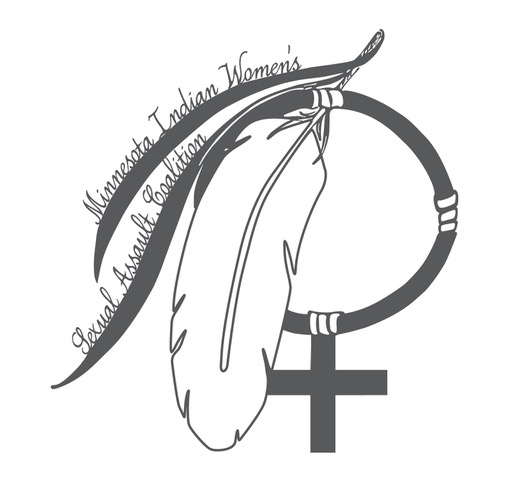Celebrating 20 Years of Work by the Minnesota Indian Women’s Sexual Assault Coalition
Organizing to End Sexual Violence Against Native People

MMIW March in Minneapolis, 2017. MIWSAC’s MMIR efforts have included marches, art exhibits, and legislative change through the Minnesota MMIW Task Force. / Photos courtesy of MIWSAC.
Organizing since 2001, the Minnesota Indian Women’s Sexual Assault Coalition (MIWSAC) celebrates its 20 year anniversary this year. MIWSAC is a culturally-based, nonprofit, statewide Tribal coalition and national technical assistance provider training and organizing in Tribal communities specifically around the topic of sexual violence, sex trafficking, and emergent and historical intersections.
MIWSAC started with a group of Native women exhausted by the invisibility and silence surrounding the high rates of sexual violence Native women and children were experiencing. What began with a single staff member, Nicole Matthews, Executive Director/Mindimooyeh/Kunsi (White Earth Band of Ojibwe); and a group of committed women as Coalition membership, MIWSAC has grown to a staff of 13, with 40 programs and over 100 individual members who inform every aspect of the work of MIWSAC.
MIWSAC’s vision is “Creating Safety and Justice for Native Women Through the Teachings of Our Grandmothers.”
MIWSAC’s vision is “Creating Safety and Justice for Native Women Through the Teachings of Our Grandmothers.” To embody this, our founding mothers and grandmothers ensured a return to our Indigenous practices of governance and daily operations by renaming our Board of Directors as the Circle Keepers. The Circle Keepers and staff continue to uphold our ancestral decision-making practices of hearing every voice, and honoring the gifts that each person brings to the work. We look forward to continuing to lead with Tribes, Tribal organizations, sister coalitions and our many allies and partners.

Some of our key accomplishments, milestones, and contributions to changing the cultural norms imposed on tribal nations and Native peoples reflected in the disproportionate rates of sexual and domestic violence include the following:
- 2007: The first Annual Statewide Conference with a Pow-wow to honor Survivors
- 2008: Red, purple, and teal Solidarity Shawls to raise awareness about sexual violence and Missing and Murdered Indigenous Relatives (MMIR)
- 2009: The Barrette Project: Living Platform to anonymously share survivor stories
- 2010 invitation by the Office on Violence Against Women to MIWSAC to provide technical assistance and training to Tribes receiving funds under the Tribal Sexual Assault Services Program (TSASP). The Program has grown from less than 20 Tribes funded to now 39 Tribes funded to enhance their ability to respond to sexual violence.
- 2011: Garden of Truth: The Prostitution and Trafficking of Native Women in Minnesota Report, which continues to remain relevant today.
- 2012: “Keeping Native Children Safe” resource manual on the intersection of child sexual assault and custody and visitation issues.
- 2013: Native Girls Camps began to include concurrent Native Boys Camps
- 2014: Native Focused 40-Hour Sexual Assault Advocacy Curriculum created, with nearly 1500 participates to date
- 2015: Making Space to Rise: Native Men & Boys Preventing Sexual Violence Video and Discussion Guide
- 2016: LGBTQ Two Spirit Advisory Group and Resources developed
- 2017: Funding expands to include state and foundation work
- 2018: The beginning of a series of 3 Indigenous Men’s Summits, attended by over 400 Native men and youth in northern Minnesota
- 2020: Display of 3000 red dresses on the Minnesota state capitol lawn that provided the political will for state legislators to create an MMIW Task Force and the first state MMIR Office
- 2021: Native Hip Hop artist, Miko Blaze, wrote Protect Them, with a music video to stand in solidarity with BIPOC folks who experience similar violence
MIWSAC also serves as a national technical assistance provider for the following additional programs and projects:
- Project Beacon (Urban Indian programs serving victims of sex trafficking);
- Sex Trafficking in Indian country and Alaska;
- Elevate | Uplift; and
- Recently awarded to operate the National Tribal Sexual Assault Clearinghouse
MIWSAC provides all training, technical assistance and digital and printed resources free of charge. Please visit miwsac.org.
As MIWSAC continues our work to address and end all forms of sexual violence, we know the intersections that our work has with many other movements, including disability rights, anti-carceral movement, and anti-racism work. Those intersections are intrinsically linked to the future of our movement.
MIWSAC is developing a report addressing Sex Trafficking of Native LGBTQ and Two-Spirit Relatives. MIWSAC is also working in solidarity with our Black sisters from A Long Walk Home, which is a national art organization based in Chicago that empowers young people to end violence against girls and women. This project centers on using art and community to address the intersections between anti-Blackness, anti-Indigeneity, and complex identities. This Minneapolis-focused project will be expanded and lessons learned incorporated throughout all of our work. MIWSAC is also doing internal work on anti-racism and anti-Blackness in collaboration with Shared Time Wisely, Inc.
In addition to the focused anti-racism and anti-oppression work, MIWSAC is organizing to address the systemic barriers facing Indigenous women on and off Tribal lands and under concurrent federal and state jurisdiction who remain disproportionately vulnerable to sexual violence. Developing our voice on state and national public policy as well as supporting new leaders within our Tribal Coalition are important to MIWSAC’s future.
LEARN MORE ABOUT MIWSAC
Connect with the Minnesota Indian Women’s Sexual Assault Coalition and access all resources: miwsac.org
Follow MIWSAC on Social Media:
- Facebook: fb.com/MIWSAC
- Instagram: miwsac
- Twitter: @miwsac






